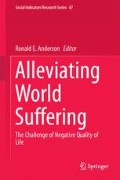Abstract
A caring economy is one that supports policies and rules based on the value of caring for ourselves, others, and nature. The ideas around caring for ourselves and our environment, and caregiving to others, are instrumental to the underlying ethos of caring economics. Market-based economics tend not to explicitly address issues around compassion, caring, empathy, or well-being. Instead, its focus is on self-interest, which presumably is necessary for rational decision-making by maximizing an individual’s utility. Or is it? Some challenge this assumption and describe ways that compassion and empathy can be taught, can be integrated into structures of business, organizations, and communities, and essentially push toward more caring economies. Suffering is often directly tied to economic well-being so the implications are significant for many. This chapter explores ideas about caring economies and approaches that may help alleviate suffering.
Access this chapter
Tax calculation will be finalised at checkout
Purchases are for personal use only
References
Anderson, R. E. (2014). Human suffering and quality of life. Dordrecht: Springer.
Anderson, R. E. (2015). Implication of world suffering for human progress. In R. E. Anderson (Ed.), World suffering and quality of life (pp. 3–31). Dordrecht: Springer.
Andreoni, J., & Rao, J. M. (2011). The power of asking: How communication affects selfishness, empathy and altruism. Journal of Public Economics, 95, 513–520.
Birchall, J. (2001). The new mutualism in public policy. London: Routledge.
Burnell, J., & Phillips, R. (2015). The “New” local. In R. Phillips & R. Pittman (Eds.), Introduction to community development (2nd ed.). London: Routledge.
Center for Partnership Studies. (2016). About. Accessed 31 July at http://centerforpartnership.org/
Chapman, B., & Sisodia, R. (2015). Everybody matters: The extraordinary power of caring for your people like family. New York: Penguin Publishing Group.
Davidson, R. (2015). The neural bases of compassion. In T. Singer & M. Richard (Eds.), Caring economics: Conservations on altruism and compassion between scientist, economists, and the dalai lama (pp. 45–57). New York: Picador.
Eisler, R. (2007). The real wealth of nations: Creating a caring economics. San Francisco: Berrett-Koehler Publishers, Inc..
Gonzales, V., & Phillips, R. (2013). Cooperatives and community development. London: Routledge.
Harbaugh, W. (2015). Why people give to charity. In T. Singer, & M. Richard (Eds.), Caring economics: Conservations on altruism and compassion between scientist, economists, and Dalai Lama (pp. 97–115). New York: Picador.
Henrich, J., Boyd, R., Bowles, S., Camerer, C., Fehr, E., Gintis, H., McElreath, R., Alvard, M., Barr, A., Ensminger, N. S., Hill, K., Gil-White, F., Gurven, M., Marlowe, F. W., Patton, J. Q., & Tracer, D. (2005). Economic man in cross-cultural perspective: Behavioral experiments in 15 small-scale societies. Behavioral and Brain Sciences, 28, 795–855.
Hopkins, R. (2011). The transition companion: Making your community more resillient in uncertain times. Vermont: Chelsea Green.
Mondragon Corporation. (2016). Our principles. http://www.mondragon-corporation.com/eng/co-operative-experience/our-principles/.
Phillips, R. (2012). Food cooperatives as community-level self-help and development. International Journal of Self-Help & Self-Care, 6(2), 189–203.
Phillips, R. (2015). Building community well-being across sectors with “For Benefit” community business. In S. J. Lee, Y. Kim, & R. Phillips (Eds.), Community well-being and community development, conceptions and applications. Dordrecht: Springer.
Piff, P. K., Kraus, M. W., Kote, S., Cheng, H., & Keltner, D. (2010). Having less, giving more: The influence of social class on prosocial behavior. Journal of Personality and Social Psychology, 99(5), 771–784.
Ricard, M. (2015). A buddhist perspective for survival: Altruism. In T. Singer & M. Ricard (Eds.), Caring economics: Conservations on altruism and compassion between scientist, economists, and the dalai lama (pp. 45–57). New York: Picador.
Rothschild, J. (2009). Workers’ cooperatives and social enterprise. American Behavioral Scientist, 52(7), 1023–1041.
Sabeti, H. (2009). The emerging fourth sector. Washington, DC: The Aspen Institute.
Singer, T. (2015a). Empathy and the interoceptive cortex. In T. Singer & M. Richard (Eds.), Caring economics: Conservations on altruism and compassion between scientist, economists, and the dalai lama (pp. 27–45). New York: Picador.
Singer, T. (2015b). How to build a caring economy. Accessed 1 Aug at: https://www.weforum.org/agenda/2015/01/how-to-build-a-caring-economy
Singer, T., & Klimecki, O. M. (2014). Empathy and compassion. Current Biology, 24, 875–878.
Smith, A. (2002). In K. Haakonssen (Ed.), The theory of moral sentiments. Cambridge, UK: Cambridge University Press.
Author information
Authors and Affiliations
Corresponding author
Editor information
Editors and Affiliations
Rights and permissions
Copyright information
© 2017 Springer International Publishing AG
About this chapter
Cite this chapter
Kocaoğlu, M., Phillips, R. (2017). Exploring Caring Economies and Alleviating Suffering. In: Anderson, R. (eds) Alleviating World Suffering. Social Indicators Research Series, vol 67. Springer, Cham. https://doi.org/10.1007/978-3-319-51391-1_26
Download citation
DOI: https://doi.org/10.1007/978-3-319-51391-1_26
Published:
Publisher Name: Springer, Cham
Print ISBN: 978-3-319-51390-4
Online ISBN: 978-3-319-51391-1
eBook Packages: Social SciencesSocial Sciences (R0)

